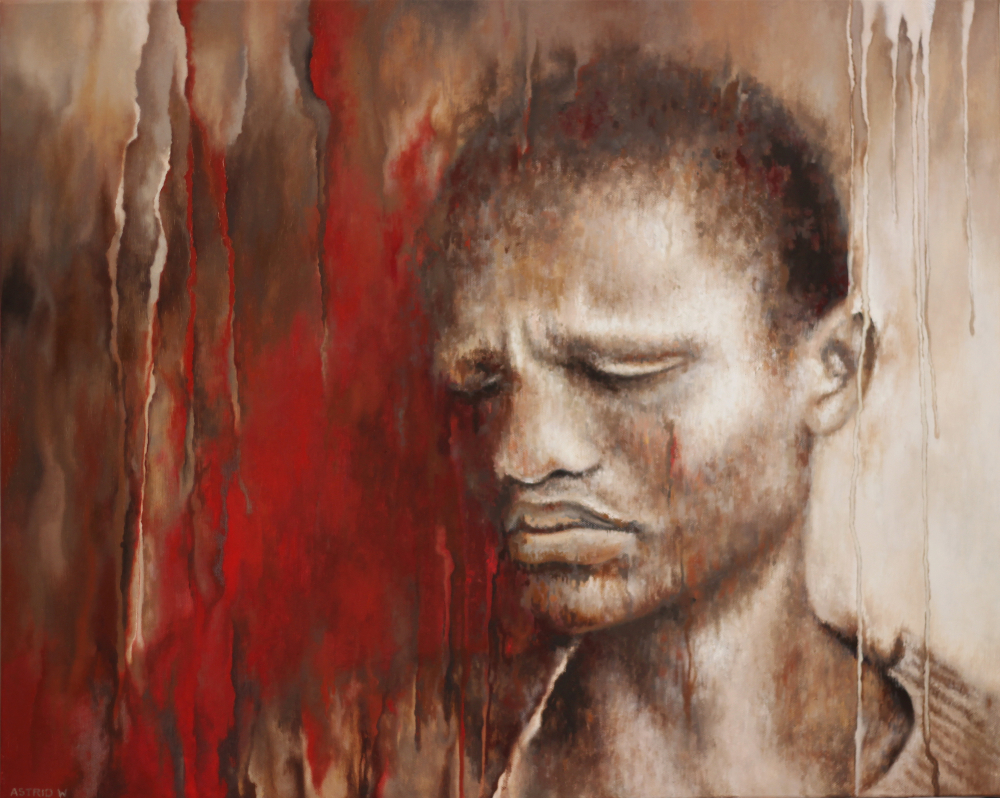The only known image of Nokuphila Kumalo
The Iziko South African National Gallery has agreed to amend an exhibition by Zwelethu Mthethwa, a man on trial for the murder of Nokuphila Kumalo (23). The Sex Worker Education and Advocacy Taskforce (Sweat) condemned the national gallery for showcasing Mthethwa’s work on women’s identities and, since then, the gallery has faced widespread criticism.
In April 2013, Kumalo was kicked and beaten to death on a street in Woodstock, Cape Town, where she worked. Not much is known about Kumalo and the only known image of her is a police photo of her lifeless body. Shortly after the murder, Mthethwa, an internationally renowned photographer, was named as the accused.
Despite a woman being beaten to death and Mthethwa’s fame, the case garnered little attention and was swallowed into a void as public furore around the Oscar Pistorius trial and Shrien Dewani grew.
Those who knew of the Kumalo case had largely forgotten about it. Then, the gallery decided to showcase Mthethwa’s work in a display that would run concurrently with a 16 Days of Activism exhibition.
Sweat sent out a statement strongly condemning the gallery and, within 48 hours, an agreement was made.
“We have agreed on a way forward that includes constructive dialogue as well as direct action, the inclusion of our painting in an upcoming exhibition and an addition to the text that accompanies Mthethwa’s work,” Ishtar Lakhani, Sweat’s advocacy and human rights defence manager, told the Mail & Guardian.
Sweat commissioned artist Astrid Warren to paint a portrait of Kumalo after her death. The advocacy group said that if Iziko was firm in its commitment to challenge patriarchy in its exhibition with Mthethwa’s work, titled Our Lady, they would include the painting of Kumalo.

Iziko has supported the use of Mthethwa’s work in the exhibition, saying that his photos promote critical engagement rather than the photographer’s career. The exhibition aims to celebrate women’s bodies and disrupt patriarchy.
“It is contextualised within a theme of the exhibition that looks at portraits of ‘unnamed women’. The inherent brutality of denying a woman the right to her individuality and her name by varying social constructs and systems has been unpacked with the inclusion of five different artworks made over the course of many years by five different artists,” Iziko and the New Church Museum said in a statement.
Justice in the gallery and in the courts
The curator of the exhibition, Kirsty Cockerill, has defended the decision to add Mthethwa’s work to the collection to “open up dialogue rather than pretend these problems in society don’t exist”.
“Curators are not judges and museums are not courtrooms,” was quoted as saying by IOL.
But Kumalo’s murderer has yet to be brought to book in a court of law three years after her death. Her mother is her closest surviving relative.
On Wednesday, Mthethwa appeared in the Cape Town high court, where his lawyer, well-known defence attorney William Booth, argued that Mthethwa did not remember the events that took place on the night of Kumalo’s murder because he had consumed too much alcohol. A psychologist was called to testify for the defence.
There have been some in the art world who have defended Mthethwa, saying he can’t possibly be guilty. Others have said that his temper has a short leash. Although in South African law the accused is innocent until proven guilty, Sweat maintains that sex workers in particular are sidelined by the law, because they are criminalised.
“The ability of sex workers to access courts if their rights are violated paints a far more distressing picture as they are criminalised, stigmatised and discriminated against for a multitude of reasons,” Lakhani said.
In 2014, civil society groups including the Women’s Legal Centre and Sonke Gender Justice, released a statement about the silence of sex workers when they are victims of crime.
“As a sex worker who experienced a lot of abuse from police and being raped, I never reported it because of laws that are used against us as sex workers,” said Dudu Dlamini, a sex worker activist.
A collaborative project between Sweat and the University of Cape Town’s Knowledge Co-Op found that between a third and half of sex workers experience violence in their workplace, and at least 70% of sex workers are abused by police.
“Based on this reality, Sweat and Sonke are fully committed to supporting the voice of sex workers and advocating for their rights in the face of a society and institutions that try to invisibilise them,” Lakhani told the M&G.
Lakhani countered Cockerill’s claim that Mthethwa’s work would promote an open conversation, because his work is not properly contextualised — the artist statement explaining his work does not mention the accusations levelled against him.
“We are questioning this commitment [to dialogue] as putting up a painting without the transparency of contextualising the artwork does not create an ‘open dialogue’,” she continued.
Reaching a resolution
Mthethwa’s artist statement will now have to be revised, although Iziko told the M&G that they have not yet spoken to the photographer. Sweat will also be outside the museum tonight in protest against Mthethwa’s inclusion in the exhibition.
While activists fight to restore Kumalo’s rights after her death, there’s yet to be a verdict in the pursuit for her killer. The state prosecutor in the case has produced CCTV video footage of a man in a Porsche approaching a woman, before exiting the vehicle and beating her until she is no longer able to move. Mthethwa’s lawyer argued that because the man’s face is not visible, the footage can’t be linked to Mthethwa.
Kumalo’s mother, Eva Kumalo, works at a popular bakery in Cape Town. In April, she told one reporter that she was worried that she couldn’t go to court, because she had already given up on her daughter’s case.